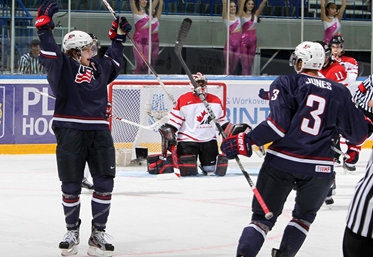Where does Canada go now?
Where does Canada go now?
Semi-final loss to U.S. offers chance to reflect

 Canada's 5-1 semi-final loss to the United States came as a shock to many Canadian fans. Photo: Andre Ringuette / HHOF-IIHF Images
Canada's 5-1 semi-final loss to the United States came as a shock to many Canadian fans. Photo: Andre Ringuette / HHOF-IIHF Images
Canada’s last gold medal came in Ottawa in 2009. This is the longest title drought since the stretch of 1998 to 2004. The Canadians will face Russia for bronze on Saturday.
In some countries, playing for a bronze medal two years in a row would be considered a worthy achievement. But in hockey-mad Canada, pointing out that this is a chance for a 15th consecutive medal at the tournament – a legacy of remarkable consistency – offers scant consolation.
So what did go wrong in the 5-1 semi-final loss to the archrival Americans?
Fundamentally, Canada came out looking complacent and slow. It just wasn’t prepared to match the speed and flair of its opponents.
“It seems like we didn’t have legs at the beginning and they were all over us,” said Jonathan Huberdeau.
The Americans dictated the pace and terms on which the semi-final was played. They played a more creative, cohesive game based on puck control and passing. Trading chances played to the U.S.’s advantage when Canada had no answer for flashy, diminutive Boston College-trained forward John Gaudreau, who finished with two goals and an assist.
U.S. captain Jake McCabe broke down what happened at the start: “We used our speed to our advantage. Our forecheck was awesome. Our gaps were awesome. They really didn’t know what hit them, I think, in the first [period].”
Later in the game, Canada ran into penalty trouble that hindered it from making a comeback.
Even though Canadian starting goalie Malcolm Subban allowed four goals on 16 shots before getting yanked for Jordan Binnington, you can’t pin this loss on him. Subban had little chance on the first three goals, being screened on perfect shots.
Yet part of the reality of this loss is that the Canadians haven’t gotten clutch goaltending in elimination games for four straight years. That contrasts with the past when the likes of Jimmy Waite (1988) and Manny Legace (1993) actually stole games for the motherland of hockey.
More of a concern was Subban’s body language and what it communicated to his teammates. He shrugged in “What could I do?” fashion as pucks got past him, contrasting with U.S. goalie John Gibson. Nothing seemed to bother the 19-year-old from the Kitchener Rangers, who stoned Ryan Strome repeatedly, and put a little extra mustard on a third-period glove save on Nathan MacKinnon with 11:54 left.
“Gibson stood on his head at the end,” said captain Ryan Nugent-Hopkins.
What about the big picture?
It is a myth that Canada will inevitably win when it has all its best players available. See the 1996 World Cup of Hockey, the 1998 and 2006 Olympics, and this year’s World Juniors.
Of course, Canada handily prevailed at previous World Juniors where an NHL work stoppage afforded the luxury of a dream roster (1995, 2005).
However, not all crops of Canadian players are created equal. It just so happened that in 2005, for instance, the available talent was exceptional. How likely is that the members of this year’s World Junior team will go on to match or surpass the international and NHL accomplishments of 2005 alumni like Sidney Crosby, Patrice Bergeron, Corey Perry, Ryan Getzlaf, Mike Richards, Shea Weber, and Brent Seabrook? It’s possible, but a long shot.
This year, you can’t simply allege that Canada was unable to adapt to the larger ice surface used in Ufa. Canada is perfectly capable of winning on the big ice, as evidenced this century by the 2002 Salt Lake City Olympics, the 2007 and 2008 World Juniors, and the 2003, 2004, and 2007 World Championships.
It comes down to having the right mental attitude. There’s a difference between justifiably aiming to win gold – which Canada should do each year – and becoming overconfident.
Canadian coach Steve Spott reiterated that it’s not Canada’s “divine right” to win this tournament every year. But that’s sometimes hard to reinforce in the minds of young players, especially when the Canadian media fosters a hero-worshipping atmosphere and implies this tournament should be an annual coronation for their team.
Subban inadvertently revealed a problematic outlook when he said after the 2-1 round-robin win over the Americans: “I felt this was a game that was easier to get up for than other games.”
It’ll remain a mystery why Canada couldn’t replicate that solid effort in the semi-final rematch, but the point is that this is a World U20 Championship. It only lasts 11 days. You have to respect your opponents’ abilities throughout, whether it’s the Americans and Russians or the Slovaks and Germans. Otherwise, you’re setting yourself up for pitfalls.
“Growing up, I watched (Sidney) Crosby and those guys play and they were just going through this like ‘No problem,’” defenceman Ryan Murphy noted before the tournament started. “That gave people the impression that this is a tournament that Canada shows up, collects a gold medal and flies home. But at this point, the margin of error is so slim.”
Ken Dryden once pointed out that in sports, there are no final victories. At present, it’s clear that Canada, the U.S., Sweden, and Russia have all established U20 programs that can put them in striking distance of a gold medal in any given year.
Canada’s sheer depth, however, should still give it an edge. And if it can tap into that talent pool by bringing more high-skilled players in the mold of Nathan MacKinnon and Jonathan Drouin to the 2014 IIHF Ice Hockey U20 World Championship, the gold drought just might end in Malmö, Sweden.
Back to Overview





















































